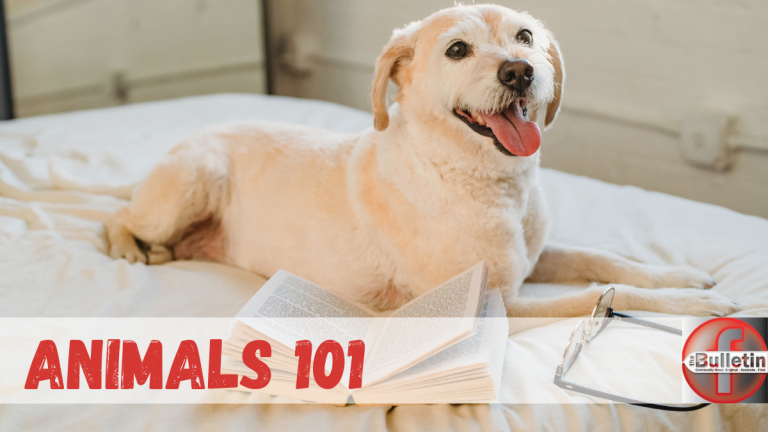
UNDERSTANDING CRUELTY TO ANIMALS CAN HELP YOU JOIN THE FIGHT AGAINST IT MORE EFFECTIVELY!
Last week we looked at how to better understand cruelty and recognize the signs of cruelty. This week, we will look at how you can report cruelty and help us fight and prevent cruelty against animals.
The industry often says that animals are voiceless, but they do have a voice; they are just unheard. They can’t dial 911. They aren’t able to alert authorities to abuse, and they can’t quietly discuss their pain and injuries with a veterinarian. You have to be the eyes and ears for the animals you encounter to ensure that if there is any abuse, it can be stopped in time or prevented. If you do not report cruelty, then you are complicit.
As we mentioned last week, neglect may require an educational visit from an animal welfare inspector, and abuse may require the removal of the animal from the home and prosecuting the offenders. Either way, your call will guarantee a better life for that animal.
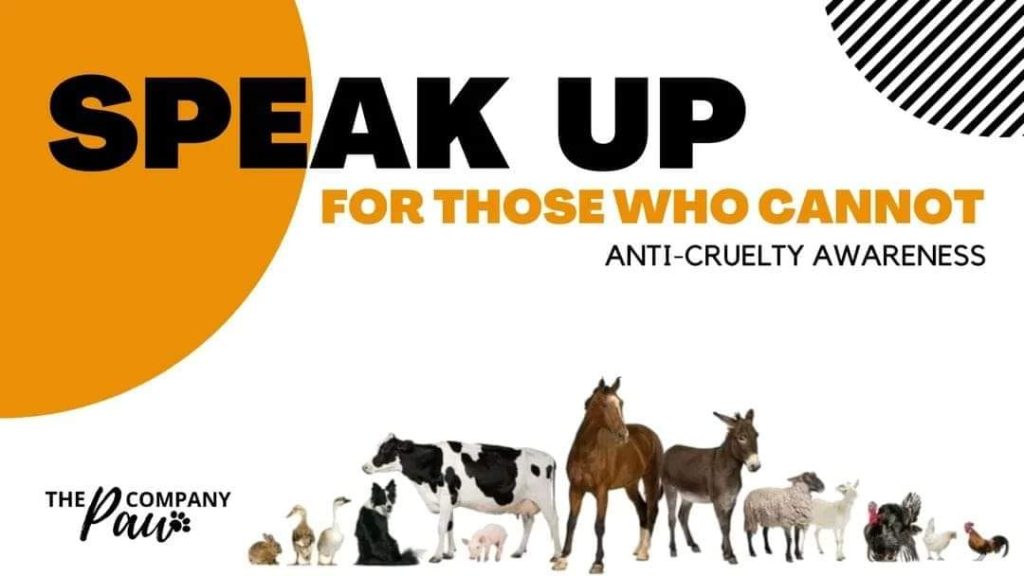
REPORTING CRUELTY
In the past, only the SPCA handled cruelties, but luckily, we now have more inspectors from other organizations, authorized by local Magistrates across South Africa. Still, save your local SPCA office and emergency numbers on your phone as the SPCA may not refuse an animal. Also, include the numbers of the areas where your friends or family stay or where you visit frequently. Find your nearest SPCA via the NSPCA website if you do not have another local authority.
HOW TO REPORT CRUELTY
Please understand that the SPCA or animal welfare organizations can’t always just take the animal. There is a legal process to follow!
Inspector Marius (Secunda) shares the following tips for reporting cruelty:
ENSURE PERSONAL SAFETY FIRST
• Do not confront the suspect if you feel unsafe.
• Do not trespass on private property to gather evidence.
BE THE ORIGINAL COMPLAINANT
• You must be willing to make the report yourself.
• Reports made via hearsay (e.g., “my friend saw…”) cannot be used in court.
GATHER CLEAR EVIDENCE
• Take photos or videos if it is safe and legal to do so.
• Write down:
o Date and time of the incident
o Location (provide a pin when possible)
o Description of what happened
o Number and type of animals involved
PROVIDE A WRITTEN STATEMENT
• Prepare a written, signed statement with your full name, ID number, and contact details.
• Describe the incident in your own words.
• This statement is essential for legal prosecution.
CONTACT THE RIGHT AUTHORITY
• Report directly to the Animal Welfare Inspector or your local animal welfare organisation.
KEEP RECORDS
• Keep copies of all evidence, reports, and correspondence.
• Note the name of the officer or inspector handling your case and follow up!
The new Animal Welfare Inspector in town (Secunda) is Marius van Reeuwyk, from SAAWIA. He has been taking a lot off our plate and can do more than we can legally, which will help the animals immensely. He can do wellness checks (when you suspect cruelty/neglect) and deal with cruelty or animal emergencies. We won’t have to run around between the SPCA and the NSPCA anymore, either. Please know that he does not get paid by anyone, so for us to help the animals locally, we need the community to help him, too. Please consider donating to his work on a regular basis.
If you have a problem with the way an Inspector conducts themselves, then please contact The Paw Company
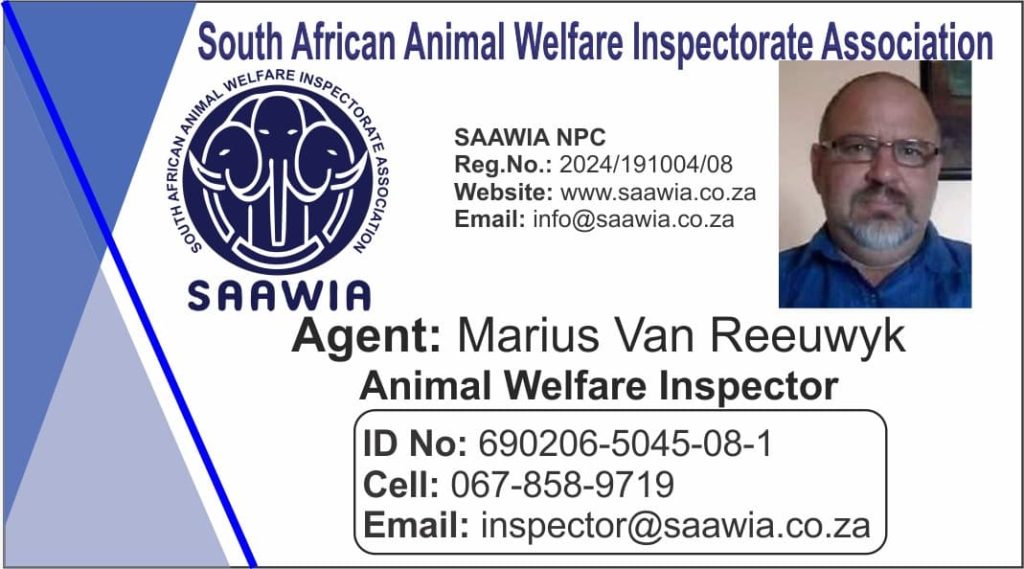
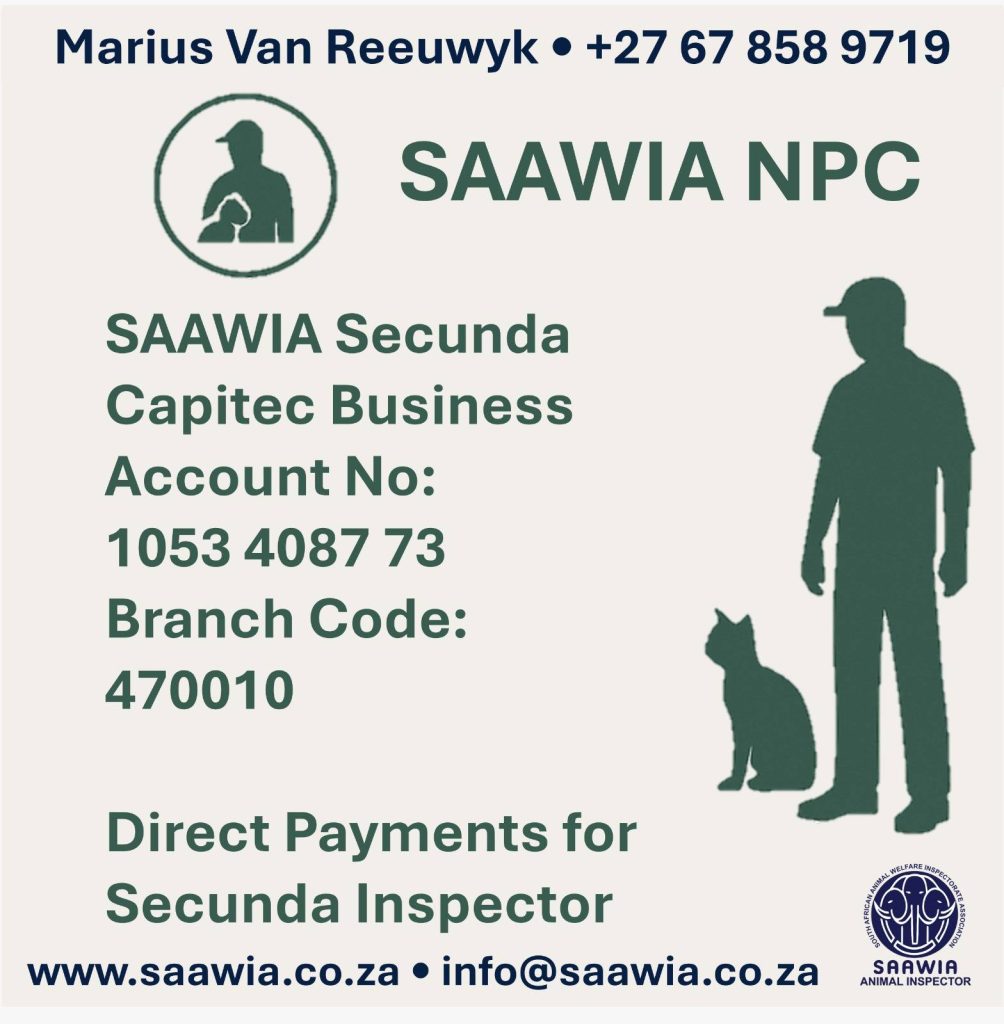
ALWAYS REPORT SUSPECTED CRUELTY!
If you notice an animal that appears to be suffering, call your local animal welfare agency immediately! Do not send a message or email, or do this through social media, as we lose precious time! Call until they answer! It can be done anonymously (to a point) and even if you are unsure, rather report so the SPCA or other authority can investigate. You can find an SPCA near your location or contact the NSPCA directly. You can also report it to your local SAPS, but I would rather do it through other local animal welfare organizations willing to assist.
If you are unsure whether it is cruelty or not, report it anyway! Please remember that no inspector can just take an animal away on the first visit. They need proof of the cruelty/neglect, and there is a process to follow, including writing a notice to comply or warnings before a warrant can be obtained for the removal of the animal in question. In clear-cut cases, it can happen faster.
When you call them and they go out, and you feel nothing has happened, follow up and contact the NSPCA (nspca@nspca.co.za) if it was reported to the local SPCA. When it happens again, please contact them again and provide affidavits where possible. This will help with the process. If you report cruelty to an SPCA and they claim it is not their area, by law, they still need to make sure that the case is attended to and provide feedback.

HELP US FIGHT CRUELTY!
- Report cruelty!
- Be a responsible pet owner. Know about and fulfill the needs of your pet. Don’t just concern yourself with basic needs – give your pet positive experiences that really enhance their well-being. It is a lifetime commitment, not just when it suits you.
- Be an example of kindness to other pets. Foster a pet that has suffered abandonment. Sadly, many pets are relinquished to shelters for various reasons. Foster homes help these animals recover and prepare them to move on to a new, permanent, loving home. If you can, ADOPT!
- Intervene if you witness animal cruelty, abuse, or neglect. Do what you can to stop someone from mistreating an animal. However, be sensible and if necessary, seek help from other witnesses or authorities. An animal that has been mistreated needs support, sometimes immediately. You can make a real difference by taking an animal out of a harmful situation.
- You can keep food, water, a leash, and a blanket in your car. If you see an animal in need or roaming around, you can help. Approach only if it is safe for both you and the animal, as we do not want them to run away into danger. If the animal is hurt, stay with them or follow them at a safe distance while you wait for your local animal welfare organizations to come and assist you. If you can pick up the animal, take them to your Vet, the SPCA, or into your yard until the owners are found.
- Teach your children to have respect for animals. Set a good example by being respectful towards animals. Show children how to interact with and treat animals with love and consideration. Even if your pet allows it, kids should not be sitting on or pulling on the ears or tails, etc., of pets. Help them grow up to become the next generation of advocates for animals. Children who are cruel to animals often grow up to be cruel to people as well. Nip animal cruelty in the butt early on, even better, prevent it!
- Know the legislation & support legislation that promotes kindness to animals. Stronger animal welfare laws and harsher penalties for abusers will lead to fewer cruelty cases. Support the campaigns and advocate for animal rights! Ask what animal welfare policies the political party you support has. You can read the Prevention of Cruelty to Animals Act, 1993 (Act 169).
- Animal and social welfare link – Consider that neglect of animals can be closely linked to domestic violence. Animal abuse usually precedes or is concurrent with other abuse. By reporting your suspicions, you may also be helping both the animal in need and the family members concerned.
- Educate people around you about the issue. Help people to understand that they can intervene in situations where animals are being neglected or even tormented. Animals have a right to live without fear or pain, and we have a responsibility to step in if their rights aren’t respected. Promote programs at schools! You can read more on specific educational animal welfare topics on the NSPCA website.
- Offer help to people who seem overwhelmed with their animals. Animals aren’t necessarily neglected out of a lack of love. An owner may not have the psychological resources to provide an animal with the appropriate care. Whatever the reasons may be, an affected pet must be removed from a place of neglect and given the care it needs to live and thrive. Any help you give to an animal may help a human, too.
- Volunteer in animal welfare, whether it is by fostering, helping at kennels, sharing posts, or donating to those who do the work. Take care of those animal welfare workers in the trenches, so they can continue this sad and tough job. Whether it is words of encouragement, a gift, treatment, or just a coffee.
- Using cruelty-free products like skin/body/hair/make-up, and clothes. The www.humaneguide.co.za products are endorsed by Beauty without Cruelty (South Africa), where the manufacturers/companies do not test on or pay for testing on animals. Don’t be fooled by companies’ smart and sly slogans. It is never what the company claims, but what they can prove! Be informed!
- Don’t support “free to good home” ads and report the selling of animals on social media. Facebook, Instagram, and WhatsApp do not allow for the selling of live animals! Don’t support breeders, pet shops, animal dealers/brokers, the circus, aquariums, petting farms, animal rides, animal sports, unethical hunting practices, or any industry that exploits animals for money or entertainment.
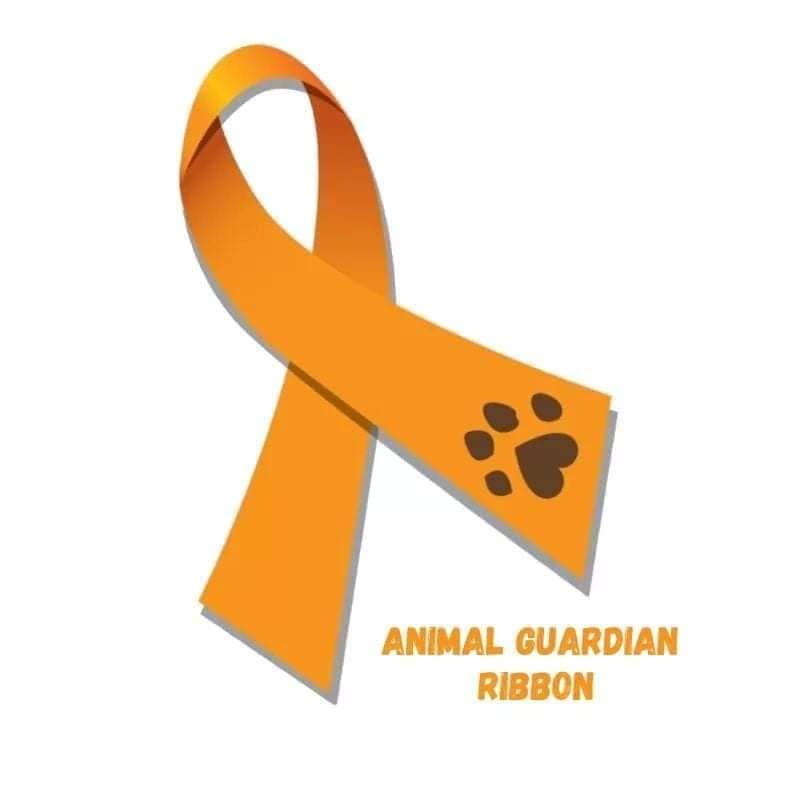
Their paws can’t call 911! Report suspected cruelty and help us prevent cruelty!
Join us again next week as we look at some safety tips for Easter.
[…] Also, read more on understanding cruelty better and helping us prevent cruelty. […]